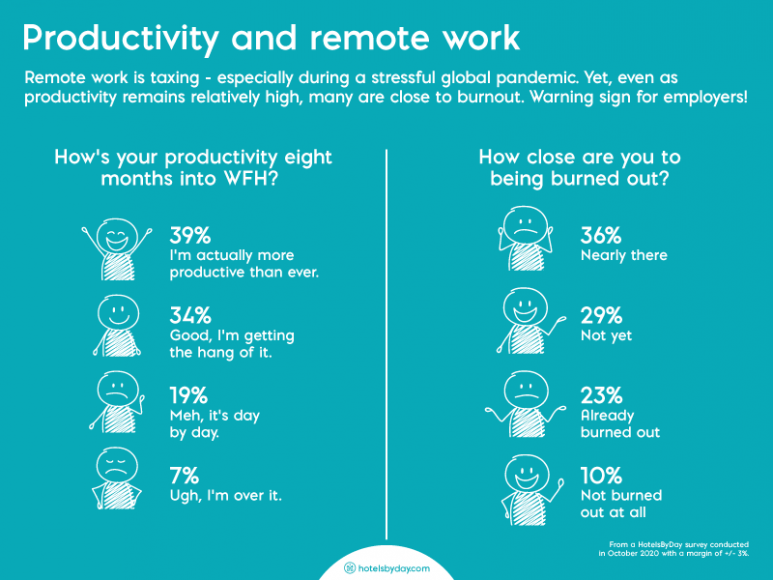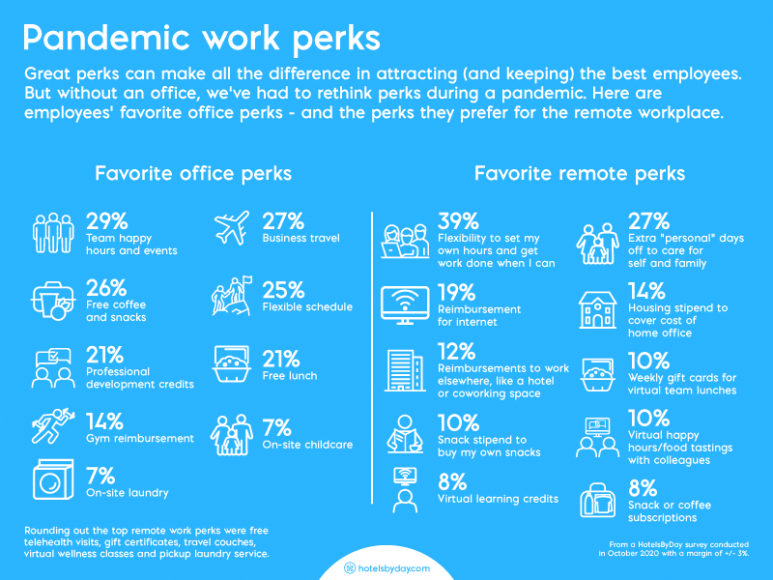Work Perks and Working From Home: What Employees Want in a Remote Workplace

From 30-hour workweeks to surprise days off, companies are rethinking work perks in the remote-first workplace. But are employer instincts and worker wants aligned? To find out, we at HotelsByDay surveyed 1,109 remote workers based in the US.
As a service provider newly serving remote workers, we were curious to explore the differences between office life and working from home. We wanted to understand how employees are adapting to the new work-from-home reality and identify opportunities for employers to boost productivity, morale, and engagement.
Productivity Soars, But So Does Burnout
We were surprised to find that the majority of respondents reported high productivity. Even nine months into working remotely, 39 percent say they are more productive than ever, and 34 percent say they are getting the hang of working from home.

While many did feel more productive, only 10 percent of workers reported not feeling burned out at all. Worryingly, the majority reported significant burnout: 36 percent said they were “nearly there,” and 23 percent were already burned out. Yikes!
That level of burnout may also explain why 3 in 10 workers have considered quitting during the pandemic. Remote work is a big adjustment, especially for those who’ve never worked from home before and those who now find themselves managing distributed teams. As company leaders and HR professionals, we have a duty to break the cycle of burnout, protect morale, and support our most valuable resources.
New Perks to Fight Burnout Without Harming Productivity
To prevent burnout while keeping productivity high, employers must get creative. In that vein, here are the top five perks remote workers want, according to our survey:
1. Flexible Work Hours
Setting their own work hours was the most desired remote work perk for 39 percent of workers. That makes sense, as the key advantage remote work has over the office is the ability for an employee to exercise more control over their workday.
2. Extra Personal Days
The lines between work and home haven’t just blurred — they’ve disappeared. That may be why 27 percent of remote workers said extra personal days were their favorite perk. These days can help employees fight burnout by giving them time to rest, recharge, and indulge in some self-care.
3. Internet Reimbursement
With everyone working and learning from home, many workers have had to upgrade their internet speeds. That’s why 19 percent said internet reimbursements were a top remote perk.
4. Home Office Stipend
Creating or upgrading a home office can be a costly out-of-pocket expense, which explains why 4 percent of remote workers want a home office stipend.
5. Alternative Workspaces
It’s easy to get distracted when working from home, even in the best home office. It’s understandable, then, that 45 percent of surveyed workers said they would take advantage of day passes to work at a coworking space, hotel, or other alternative workspace.
Some intriguing insights arise when we contrast those five remote-work perks with the top office perks, which were team events (29 percent), business travel (27 percent), free coffee/snacks (26 percent), and a flexible schedule (25 percent).
That last one, a flexible schedule, is especially interesting. Our takeaway here is that there may have been a “scheduling culture swap” when we all went remote. Companies that already offered significant flexibility to in-office workers may have made remote work more structured to ensure productivity didn’t suffer. As a result, many employees feel even more pressure to be available while working from home. In fact, the average workday actually lengthened by 48.5 minutes during the pandemic — not a good recipe for avoiding burnout!

Another major takeaway for my team is that tackling burnout is key to maintaining productivity. When you look at both employees’ favorite office perks and their favorite remote perks, you’ll see that many are related to escaping the routine mundanity of work and venting some pressure. Catered lunches and free snacks are awesome, but the priority should be perks that give employees the breathing room they need to do their best work.
Looking to 2021
Hopefully, our survey results can offer a baseline to help shape your discussions as you evaluate changes at your own company. That said, as you plan your benefits and perks for the year ahead, it’s always best to ask your employees directly. Each culture is unique and each employee has their own needs and preferences. Transparency and control are powerful tools for employee engagement, especially when we’re all decentralized and working remotely!
Yannis Moati is the CEO of HotelsByDay.

